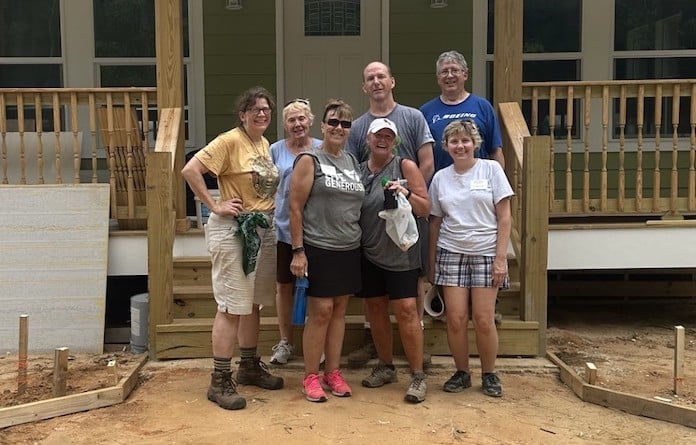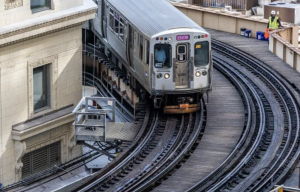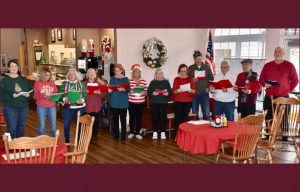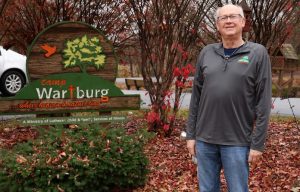Sending love to Biloxi

A group of parishioners from St. Paul United Church of Christ in Columbia recently took a mission trip to Mississippi, offering their services to a long-lived mission which focuses on caring for the local homeless population.
Kathleen Habermehl served as the organizer for the trip. She offered some insight into both the trip and the organization the participants worked with: Back Bay Missions in Biloxi, Miss.
Habermehl noted Back Bay has been active since the 1920s, though they gained a bit more national awareness following the devastating impact of Hurricane Katrina on the gulf coast and the mission itself.
It’s become something of a hub for UCC parishes across the country, though plenty of other congregations also travel south to spend time there.
“Back Bay Missions has been there since the 1920s, really old mission,” Habermehl said. “Tons of churches go to Back Bay every year, all across from east coast to west coast, north to south, tons of UCC churches and other churches.”
According to Habermehl, this is the St. Paul UCC of Columbia’s fifth visit post-Katrina.
She noted that plenty of individuals in the parish would be happy to go more frequently, but spots at Back Bay are often unavailable, and the process for signing up can take a great deal of time.
Back Bay’s work centers around caring for unhoused individuals primarily in the Biloxi area, from those still impacted by Hurricane Katrina and other terrible disasters to those who have suffered extreme financial hardship.
“All of that area around Biloxi, there’s a huge homeless population down there,” Habermehl said. “It’s kind of a multi-tasking kinda thing all focused on the homeless folks.”
The Back Bay Mission website outlines a few of their many services. Their work is generally outlined as a three-tiered approach, with emergency assistance to provide immediate aid through financial and material support, intensive case management to help individuals out of the depths of poverty and peer support networks to allow their clients to work together as they continue to progress out of poverty.
Habermehl offered a bit more of a hands-on perspective. She or friends of hers have assisted in the mission’s food pantry, worked on constructing or repairing houses or worked in the food truck that serves as the mission’s soup kitchen.
In her experiences with Back Bay, she recalled seeing one girl volunteering with the mission’s construction side who took so readily to the jackhammer that folks started calling her Thor.
She similarly described a high school junior who excelled with scaffolding given his experience in industrial arts and a high school sophomore who flourished in the soup kitchen and worked there practically all week.
Habermehl explained that as part of the sign-up process, visitors fill out a sheet detailing any specialities or skills they might have. Back Bay makes good use of these sheets to direct their voluntary manpower.
This year’s St. Paul UCC group spent quite a bit of time doing construction work, largely taking care of the interior labor as the house itself was fully constructed.
Habermehl described how she was tasked with installing doorknobs throughout the house. Though she struggled with the first few, the Back Bay staff member overseeing the work managed to set her straight, and she wound up getting so into the work that her husband had to talk her out of changing all the doorknobs when they got home.
She also got to experience the Micah Center, one of the larger buildings at the Back Bay mission which provides clients with a wide range of services.
“The Micah Center is a place where homeless folks can go and get clean clothes. They have a whole way of doing laundry and handing them fresh, clean clothes,” Habermehl said. “And they’re able to use computers, use phones, and they can network. They have folks in there that do counseling. They’re constantly trying to get these people into housing.”
While the work itself can no doubt be satisfying, Habermehl spoke with particular fondness for the more personal experiences she had on the trip.
She was fortunate enough, she said, to get to know a few of the mission’s clients. In these conversations, one of her biggest takeaways is that many of the poor individuals Back Bay serves wound up in their position through little more than bad luck.
She recalled one man whom she spoke with each day during the recent trip who was familiar with the St. Louis metro area as he had long traveled across the country doing construction work on hospitals.
At one point, he found himself getting short of breath one day only to discover he had congestive heart failure.
Even after working diligently for so many years, one substantial health problem managed to knock him into poverty.
“For the majority, they’re just in a situation that they’re trying to get out of,” Habermehl said. “The more you talk to these people, we would sit around and talk about it, about how everybody is just a few car payments away from losing everything. It’s really pretty unfair when you see how it goes with these folks.”
Other folks who participated in the recent trip had experiences quite similar to Habermehl, from the work to the personal connections.
Joanne Counce was among the first individuals from the parish to volunteer at Back Bay right after Hurricane Katrina.
She recalled how the volunteers – who are now housed in a sort of dormitory with separate wings to house 25 men and 25 women – stayed in trailers throughout their trip.
Work then, Counce described, centered around repairs from Katrina, tearing down mold and rushing to the store to get building materials before they were all swiped up by others rushing to the store.
Much like Habermehl, Counce expressed that meeting other people – either folks from the home parish or Back Bay clients – was one of the highlights of the trip.
A key takeaway for her was also how the people she went to serve didn’t ask to be homeless.
“You just meet all kinds of people there,” Counce said. “And I think that meeting other people was the greatest thing on this trip for me.”
David Shanks was another participant in the recent mission trip, though he himself is a member of First Congregational UCC in Dupo.
Shanks spoke largely about the work side of the trip. With an engineering background – Habermehl called him one of the group’s “ringers” – he was naturally drafted to do some construction, though he wound up working in unfamiliar territory dealing with crown moulding in the kitchen.
He also said the trip was a very welcoming experience.
Shanks had heard about Back Bay for years but only recently had the opportunity to go, and he was able to meet some fellow volunteers for whom he acquired plenty of respect.
“There was a retired couple there, and they were our hosts,” Shanks said. “I think they were there about three months this past summer. It was such a welcoming experience with them. Every morning you’d meet with them and they’d go over what’s gonna happen that day. I was just really impressed by them, taking, like, three months at a time out of their life and hosting group after group after group.”
With this most recent trip behind them, parishioners at St. Paul UCC are no doubt already considering the possibility of organizing another mission trip with Back Bay.
Given how long that organizing can take, however, they would seem to have plenty of time to gather volunteers and try to gather as many donations as possible for their next visit.
“We’re constantly focused on mission, and mission itself is just human driven. It just is. It’s people,” Habermehl said. “And I think Back Bay is just all that and the whole bag of worms. It’s people. And if you’re not helping people, I’m not real sure what else you’re supposed to be doing.”






